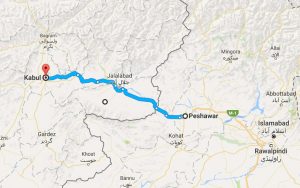The Story Is In The Journey
Our interview with Laila Hussein Moustafa about her newly published article and her research process.
Laila Hussein Moustafa is Assistant Professor of Library Administration and the Middle East and North Africa subject specialist in the International Area Studies Library at U of I. She has been conducting research around the world on disaster preparedness, especially in times of war. Her recent article in the Fall 2016 issue of RBM: A Journal of Rare Books, Manuscripts, and Cultural Heritage entitled “From Peshawar to Kabul: Preserving Afghanistan’s Cultural Heritage during Wartime” recounts the story of Nancy Dupree, a scholar who had to flee the fightings from Aghanistan and settled in the refugees camp of Peshawar, Pakhsitan, and her efforts to help recover rare books being sold in the refugees camps of Peshawar, and relocat them to an archives in Kabul. These books were being sold by the pound by black market vendors – who were unaware of their value and occasionally used their pages to wrap food.
The miracle is that these books survive at all. Besides looting many books were moved by refugees themselves when they fled their homes. These were family heirlooms that were brought along for safekeeping, only to have been sold in the black market when their owners became destitute and had to sell anything they could. The trouble in researching this process is that there is no documentation on how they were moved from their original locations in the first place. Laila intends to continue her research to discover the mysterious journey of books salvaged from the ravages of war.
As the Mushiboshi Project is preparing to conduct peers interviews, we asked Laila how she manages to find information from so many people around the world. Laila prefers to meet people face to face. She travels to different conferences and takes the opportunity to conduct interviews in person. It is helpful that she can speak the different languages of her fellow colleagues in her areas of study: Arabic, Persian, and Turkish & French. She will sometimes send a bilingual message to her new contacts, to give them the option to reply in the language of their choice.
Laila is very aware that as a result of colonization, there is a culture of skepticism and suspicion among her interview subjects that a Western scholar will come and take away information and leave nothing in return. So she is very careful to cultivate a sense of trust and reciprocity. In this way she has grown her network of research support. She forwards information that she finds relevant to them and helps find and write grants to aid their work. For example, Laila encourages her international colleagues to apply to funding from the British Library’s Endangered Archives Programme, of which she is a Board member. This is a shared digitization program which awards equipment & training to increase the local capabilities to digitize and preserve the originals. The original and the master digital copy stay at home, minimizing the fear of damage, loss or theft that other shared digitization programs have experienced. The British Library acquires a copy for its repository as part of the agreement.
No matter what language is spoken, Laila tries to avoid using professional jargon when asking questions about preservation. Sometimes a lot of the terminology used in the West has not translation in other languages. Instead she uses plain speech or simple open ended questions like: How do you keep and use you books? As she explains, above all when you are conducting your research, you can learn more when you visit if you talk less and listen & observe more.
Resources:
“Endangered Archives Programme: Grants.” 2017. Accessed January 20. http://eap.bl.uk/pages/grants.html.
Moustafa, Laila Hussein. 2016. “From Peshawar to Kabul: Preserving Afghanistan’s Cultural Heritage during Wartime.” RBM: A Journal of Rare Books, Manuscripts and Cultural Heritage 17 (2): 134–47. http://rbm.acrl.org/content/17/2/134.

